Phrasal verbs are two or more words that when put together, function as an entirely new type of word. Because of this function in the English language, it can be difficult to distinguish one form from the other. And decipher their independent meanings.
What are phrasal verbs?
Phrasal verbs are made up of two or more words that, when put together, function as an entirely new word. They have a meaning distinct from the meaning of the individual components.
For instance, to “grab” or “lift” anything is what “pick up” means; this is considerably different from the meanings of pick up alone.
Phrasal verbs are relatively common in spoken English; nonetheless, it can be challenging to understand what they mean because their meanings are not always precise, and there are thousands of them. In reality, many phrasal verbs are separate versions of the same root word, which might add to the confusion.
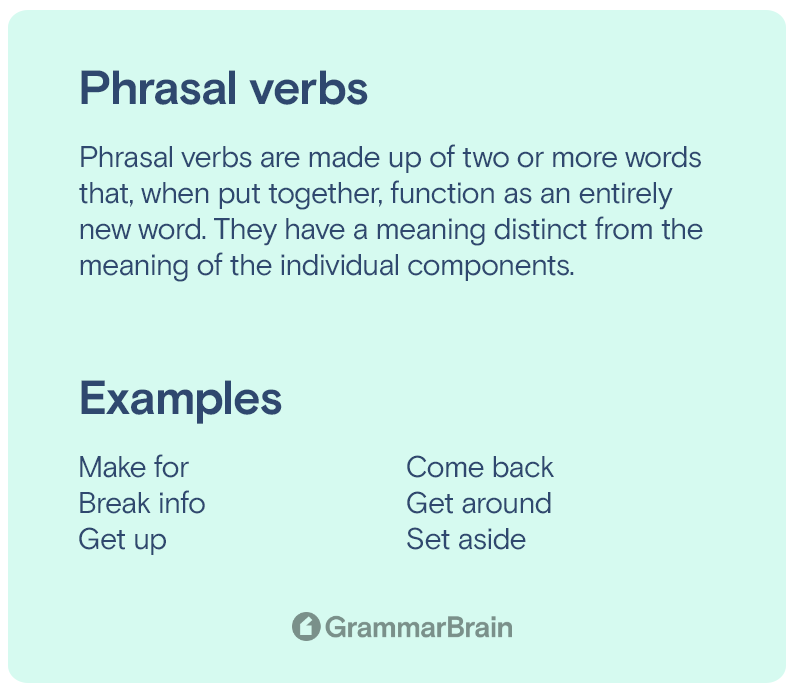
To produce a totally new verbal phrase, known as a phrasal verb, a regular verb is combined with an adverb or a preposition to form the phrasal verb.
Consider a phrasal verb to be a totally new and separate term since. In most cases, its meaning does not correspond to the implications of the individual words that make up the phrase.
When employed in a phrase, phrasal verbs operate the same as other verbs for conjugation and placement. This is true even though they do not have particular grammatical restrictions governing word order.
Since phrasal verbs may be converted into any other verb form by conjugation, you can use them in any context in which you would typically employ a regular verb.
| Check off | Pass out | Carry on | Make for | Come back |
| Come across | Let on | Do over | Break into | Get around |
| Go along | Wipe out | Take up | Get up | Set aside |
| Get out | Look up | Go off | Break out | Turn over |
Phrasal verbs vs. common verbs
A verb and a preposition joined together to form a phrase that has its unique meaning are known as a phrasal verb. There are occasions when the meaning of the phrasal verb is very unlike the meaning of the common verb when it is used on its own!
The distinction between common verbs and phrasal verbs can be relatively easily confusing. This is because phrasal verbs are utilized within a phrase in the same manner as common verbs.
In addition, we regularly utilize them in spoken English and an informal atmosphere. Therefore, it is strongly recommended that certain verbs be avoided in official writing. Because phrasal verbs may have multiple meanings, this could create an uncertain situation.
On the other hand, the setting of professional writing ought to be understandable and concise. However, there is still a great deal that we have to learn.
The following are some instances that highlight the various ways in which regular verbs can be distinguished from phrasal verbs:
1. get and get over
- James went to get the puppy from the vet.
- James easily got over his sickness.
2. grow and grow up
- The flowers grew in Sarah’s garden.
- Bill’s son grew up before our eyes.
3. find and find out
- I have found my lost mobile phone.
- James found out that his best friend was missing.
4. break and break down
- Sarah’s vase broke in the morning.
- Sarah’s car broke down in the middle of an empty lane.
5. give and give away
- Susanne gave her book to John.
- John gave away his old CD player.
Phrasal verbs vs. irregular verbs
Phrasal verbs can also be irregular verbs.
A phrasal verb is a combination of two words (either a verb and a preposition or a verb and an adverb). When used together, they often have a meaning that is distinct from the meaning of the original verb.
Phrasal verbs are treated exactly the same as regular verbs when they are used in a phrase, regardless of whether the underlying verb is regular or irregular.
Here are few instances –
- James tore up the confidential document after going through the contents of it.
- Sarah’s car broke down late at night.
- Did the teacher deal with the rowdy student who pushed his friend on the street yesterday?
What are intransitive phrasal verbs?
Phrasal verbs that do not use a direct object are called intransitive phrasal verbs. The subject is carrying out the phrasal verb’s action, and no object is receiving the action.
The action of an intransitive phrasal verb is not transferred to the target of the verb’s phrase.
Because no object has to be considered, it is simpler to utilize intransitive phrasal verbs.
Phrasal verbs can be divided into two categories: transitive and intransitive.
- Pure Intransitive Phrasal Verbs
- Ergative Phrasal Verbs
It is not possible to get at the meaning of an intransitive phrasal verb by merely combining the meanings of its component parts, as is the case with other types of phrasal verbs.
Pure Intransitive Phrasal Verbs
The particle that comes after an intransitive phrasal verb often cannot be used to distinguish the verb component of an intransitive phrasal verb from the following participle.
The following illustrations illustrate how this type operates:
- The thief took off rapidly after stealing a phone.
Because it is an intransitive phrasal verb, the action of taking off cannot be modified by the addition of an adverb in this phrase. First, let’s have a look at how it may seem –
- The thief took rapidly off after stealing a phone.
As can be observed, the statement loses all meaning when an adverb is inserted between the clauses.
Yet another illustration is as follows:
- The little girl sat down quickly on the bench.
If we insert an adverb between the phrasal verb “sat down,” the sentence will no longer make sense.
- The little girl sat quickly down on the bench.
In news reports, pure intransitive phrasal verbs are employed far less frequently than transitive phrasal verbs, and this trend is even more pronounced in academic language.
In the same way, prepositional phrases can follow intransitive single-word verbs, intransitive phrasal verbs can also be followed by such phrases. These descriptions frequently elaborate on thematic connections.
Here are a few instances –
- James and Sarah are going to move on to Paris.
- Sarah checked out of the hotel on Monday.
Ergative Phrasal Verbs
Some phrasal verbs have the form of ergative verbs, which means that they express actions carried out by the subject and experienced by the subject.
Here are a few instances –
- The fire began to die down after two hours of hard work by the firefighters.
- The sales of the store tapered off because it had been snowing for days.
- A new problem has cropped up in the investigation.
How do idioms and phrasal verbs work together?
Idioms and phrasal verbs are two types of English grammatical constructions that each have a distinct and particular function inside phrases.
Idioms and phrasal verbs often contribute to the development of sentence structure and, by extension, the meaning of the entire phrase.
As a result, it is essential for you to have a solid understanding of how to employ phrasal verbs and idioms inside a phrase properly.
You should also check the appropriate contexts in which they should be used and the precise points in the sentence where they should be included.
When utilized correctly, idioms and phrasal verbs may go a long way toward enhancing sentence structure and making your writing more fascinating.
What exactly is an idiom?
One definition of an idiom is “a combination or group of words put together to give a figurative meaning that is clearly different from the constituent words that make up the idiom.” This definition describes idioms as “word combinations or groups that give figurative meanings.”
Idioms can also refer to specific words or phrases used by people who share similar characteristics. These include people who speak the same dialect or work in the same occupational field, amongst other similarities. This usage of idioms is more common in the United States.
This may, at times, present a communication barrier, particularly in situations where you come across a novel phrasal verb and do not comprehend the context in which the phrase was employed.
Therefore, it is essential for a writer who uses any dialect-related idiom to attempt to elaborate on it.
It is important for any reader to always exercise caution when encountering idioms that he or she has not previously encountered. A reader should also try to comprehend some of the culture and dialect of the people rather than simply assuming the meaning of the idiom being used.
Because they use figurative language, most idioms are formed using phrasal verbs, which is another reason why this fact has to be brought to your attention.
What are phrasal verbs?
A phrase is constructed by combining a verb with an adjective, preposition, or both. It could be combined either before or after the verb to create an idiomatic phrase known as a phrasal verb. This type of phrase can be used either before or after the verb.
Phrasal verbs often convey a meaning that is distinct from the literal meaning of the words that are joined to produce them. As was discussed before, using a preposition in conjunction with a verb can result in forming a prepositional idiom.
Phrasal verbs can be transitive (verbs that accept a direct object) or intransitive (verbs that do not take an object) (verbs that cannot take a direct object).
It’s possible to split up some transitive verbs. This means that the verb and the adverb or preposition that makes up the phrasal verb shouldn’t be written one right after the other in a phrase. Rather, it should be split up by a direct object.
However, a pronoun will appear between the verb and the preposition in this sentence. The noun itself does not come between the noun and the preposition. On the other hand, intransitive phrasal verbs never take on direct objects, and as a result, they cannot be divorced from those objects.
Idioms and phrasal verbs
Idioms and phrasal verbs are two types of grammatical particles in the English language that may be used in various contexts to convey the intended meaning in a significantly more engaging manner.
Because of this, it is important for everyone, and especially students, to have a solid understanding of how to use certain aspects of English grammar properly.
Idioms and phrasal verbs can be used when creating tales, novels, and articles that are merely designed for pleasure, developing storylines for plays, movies, and other performing scenes. They are also used when composing poetry and songs.
Idioms and phrasal verbs, in their most basic form, are often used in the entertainment industry and academic settings. Nonetheless, they are only allowed in personal publications such as casual essays and articles.
Idiomatic expressions and phrasal verb examples
The following are some instances of idioms and their meanings that are among the most often used:
- Speak of the devil
it signifies that you are referring to a specific person at the moment, and that person immediately appears in front of you.
- Once in a blue moon
it is used to indicate something that occurs very infrequently or not very often.
- Bite off more than you can chew
it means taking on more responsibility than you can handle by putting yourself in a precarious situation from which you will be unable to extricate yourself.
- Do not judge a book by its cover
it is a phrase that advises people not to form a judgment about something or someone before getting to know the person. It also means you should not judge before directly contacting the subject in question.
- See eye to eye
it means to have the same viewpoint or concept as someone and hence to agree with that person.
- A piece of cake
It refers to anything that is relatively simple and straightforward to deal with.
- Hit the nail on the head
It describes the process of determining the precise problem in a given circumstance or getting directly to the heart of the matter about a certain issue.
- Turn a blind eye
it means ignoring something or acting as though one is unaware of anything taking place.
- Kill two birds with one stone
it refers to a scenario in which one solution is employed to address and resolve two distinct problems or concerns.
- Head in the clouds
it refers to having an aim or goal that is unattainable or thinking about something that is not achievable.
Phrasal verb grammar rules
A combination of words that together represent an action is known as a phrasal verb. Phrasal verbs are formed by attaching a particle, which can be either a preposition or an adverb, to the end of a regular verb.
Phrasal verbs are employed within a phrase in exactly the same manner as normal verbs. In addition to this, they are frequently used in spoken English and in settings that are less formal. Therefore, it is strongly recommended that certain verbs be avoided wherever possible in official writing.
The rules for phrasal verbs are as follows:
1. The meaning of phrasal verbs is distinct from the meaning of the original verb.
The formation of these words into a single unit of vocabulary expression results in a new meaning being conveyed to the phrase. For the purpose of comparison, let us use these statements as examples:
- Caleb has to get his sister from school.
- It was easy for Caleb to get over his sickness.
The original meaning of the word “get” was to acquire something. On the other hand, the meaning shifts when it is combined with a particle. In this context, the idiomatic expression “get over” refers to making a full recovery from an illness.
Additional illustrations:
- The actor broke down after he could not learn his dialogue.
- The school ran out of stationery supplies.
- James had to put off his trip to Bali because of his illness.
2. Since they do not require an object, intransitive phrasal verbs cannot be separated from one another.
These verbs, just like ordinary verbs, might be categorized as transitive or intransitive, much like regular verbs. It is not feasible to separate the particle from the verb since intransitive verbs do not require any object to complete their meaning.
Examples:
- The dog always comes back to my house for food.
- His sister wakes up at 4 AM every day.
- The actors showed up early for the premiere.
- Sarah often shops around in the store before she finally makes her purchase.
- The sadness wears off slowly but surely.
3. Some transitive phrasal verbs may either be separated into their component parts or can’t be separated at all.
Because transitive phrasal verbs receive objects, it is feasible that some of them can be disassembled or reassembled into a different order. Let’s look at these sentences and see how they stack up:
- Ron Weasley gave away his gold coins to his best friend.
- Ron Weasley gave his gold coins away to his best friend.
- Ron Weasley gave it away to his best friend.
Note that the verb and the particle can remain in the same position in the first phrase even if the object comes after them. It is also feasible for the object to come between the verb and the particle in the second phrase.
This would make the statement more complex. On the other hand, the phrasal verb has to be split up when a pronoun is used as the object substitute. Because of this, the statement that “Ron Weasley handed it away to his closest buddy” is not accurate.
Additional illustrations:
1. Call off
- Sarah called off the wedding.
- Sarah called the wedding off.
- Sarah called it off.
2. Fill out
- Fill out the registration form before giving the exam.
- Fill the registration form out before giving the exam.
- Fill it out before giving the exam.
3. Put on
- You should put on your jacket.
- You should put a jacket on.
- You should put it on.
4. Some transitive phrasal verbs are inseparable.
There are also a variety of transitive phrasal verbs in which the verb is inextricably linked to the next particle in the phrase.
Examples:
- You should go over your registration form before submitting it to the office.
- James and Sarah look after their parrots.
- Sarah ran into her best friend in the shopping complex.
- James takes after his brother when it comes to manipulating.
- Sarah can’t get over her last holiday in Paris.
5. Phrasal verbs that consist of three separate words cannot be separated.
After a verb, several phrasal verbs are generated by adding two different particles. In addition, these categories cannot be split apart.
Examples:
- The team came up with a new strategy for the project.
- Ginger can get rid off throat soreness.
- My sister looks up to me.
- James and Sarah put up with their neighbor’s loud noises.
Types of phrasal verbs
A phrasal verb is essentially a phrase that comprises the verb combined with a preposition or an adverb and falls under the purview of the English grammar system.
You can see that the meaning that is created by the use of phrasal verbs is considerably different from the meaning that is created by the use of the verbs on their own. Typically consisting of two words, but sometimes including three, their length might vary.
There are essentially four distinct categories of phrasal verbs, which are as follows:
- Transitive Phrasal Verb
- Intransitive Phrasal Verb
- Separable Phrasal Verb
- Inseparable Phrasal Verb
1. Transitive Phrasal Verb
A transitive phrasal verb is a type of phrasal verb that normally needs the presence of an object within the phrase.
If there is no object, then the statement cannot convey its full meaning or sense. If there is no object, then the sentence cannot express itself properly.
Take, for instance:
- Sam looks after his little sister after coming home.
- The team carried on with their project even during the pandemic.
- The new manager brought about a lot of new changes in the company.
- The team leader called off the meeting without prior notice.
- You can switch on the reading lamp if you want to read your novel.
- Sam is trying to give up his smoking addiction.
- The manager turned down Sam’s request.
2. Intransitive Phrasal Verb
In the instance of intransitive phrasal verbs, we may state that it is unnecessary to include an object in the sentence in order for the phrase to be understood properly.
Intransitive phrasal verbs demonstrate that a sentence’s meaning is not dependent on the presence or absence of an object.
For instance, you may have a look at the phrases that are provided below. Even though they do not contain any objects, they can nonetheless convey the intended meaning of the statement correctly.
Here are a few instances:
- Sam’s grandmother passed away last week.
- Sam always gets up at 5 AM every morning.
- The monkey ran away from Sam’s apartment.
- The little puppies are growing up.
- Sam’s car broke down in the middle of the empty road.
3. Separable Phrasal Verbs
You will notice that the phrasal verbs can be split in the case of a separable phrasal verb, which allows you to use the phrasal verbs in different locations inside a given phrase.
It is possible to separate the verbs and the prepositions. Therefore, it is possible to employ these phrasal verbs in either the joined or the separated form, depending on the context.
Consider the following sentences as an illustration and try to see the differences between them.
1. You can switch off the reading lamp.
- You can switch the reading lamp off.
2. Sam will pick up Sarah from the airport.
- Sam will pick Sarah up from the airport.
3. The protesters wanted the government to cut down the prices of gas.
- The protesters wanted the government to cut the prices down of gas.
4. Non-separable Phrasal Verbs
Phrasal verbs that cannot be broken apart into their component parts in order to be used in multiple contexts within the same phrase are referred to as non-separable phrasal verbs.
These phrasal verbs will stay in the same order as before. For instance, if you would want a deeper understanding, you might try looking at the examples.
- Sarah always looks after her little sisters.
- Sam’s grandmother passed away last month.
- The monkey ran away from his home.
- Sam is trying to give up on the unwanted project.
Phrasal verb list by topics (with sentence examples)
Phrasal verbs with the word “get”
- Get on with it
You need to get on with it if you want to complete the project on time.
- Get over
It took Sarah two months to get over her loss.
- Get out of
Sarah got out of her babysitting job, thanks to her deadline.
- Get along with
James and Charles get along with Taylor very well.
- Get through
It was such a difficult time getting through his last movie.
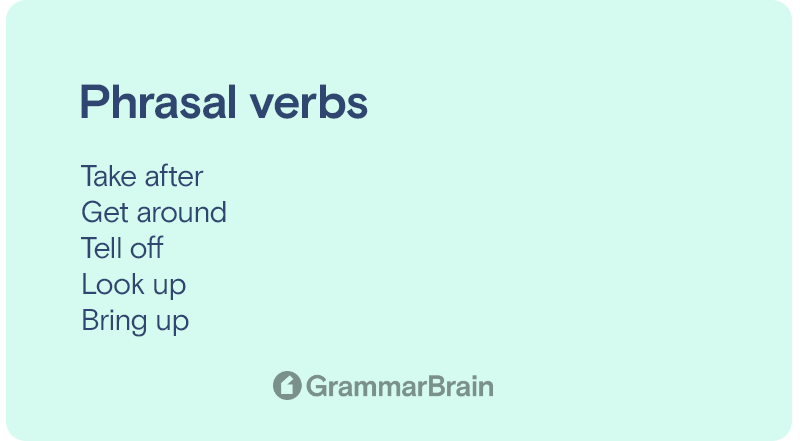
Family
- Take After
Sam’s son takes after his grandmother.
- Get round
Sam succeeded in getting round his mother to buy him the new PlayStation.
- Tell off
Sarah told her brother off for breaking her favorite coffee mug.
- Look up
Sarah’s brother looks up to her as his role model.
- Bring up
His maternal grandparents brought Sam up because his parents were busy with their jobs.
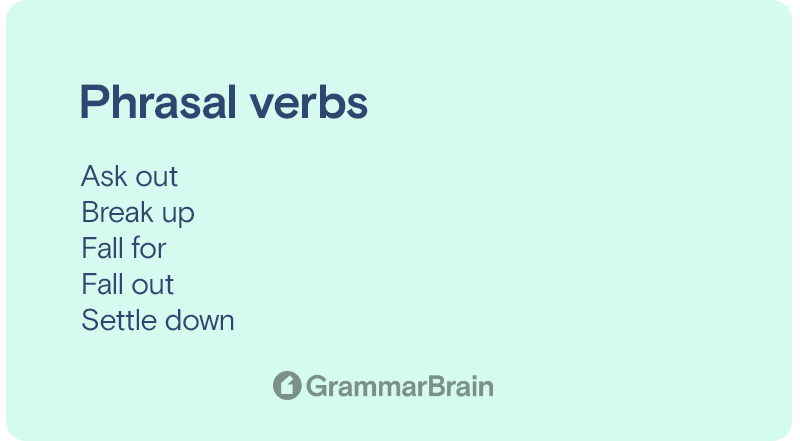
Relationships
- Ask out
Sarah asked James out for dinner many times before he finally agreed.
- Break up
Sarah and James broke up after two years of being in a relationship.
- Fall for
Noah fell for an Italian man while she was on holiday in Sicily, Italy.
- Fall out
Sarah and Noah were best friends, but they had a fall out during the summer break.
- Settle down
Sarah and James decided that it was time for them to settle down after being together for five years.
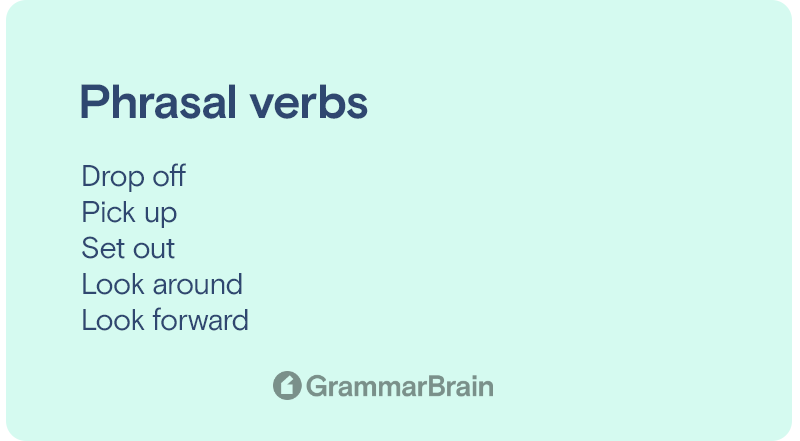
Travel
- Drop Off
James went to drop Sarah off at the airport.
- Pick up
Jose will go to the airport to pick his sister up.
- Set out
James and Charles set out on the last leg of their Europe tour.
- Look around
Charles looked around the town to find historical places to visit.
- Look forward
Sarah is looking forward to the next weekend because she is going on a short trip with her best friend.
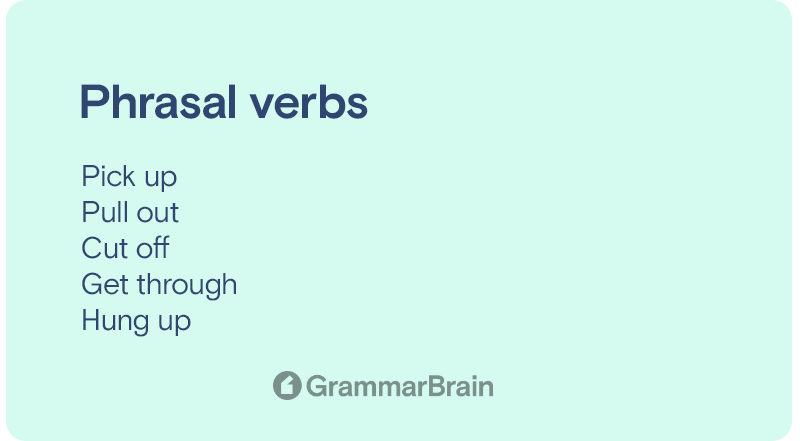
Phones
- Pick up
James called Sarah, but her brother picked up the phone.
- Pull out
Sarah pulled out her new iPhone from her pocket.
- Cut off
The call was cut off due to bad signals caused by the rainstorm.
- Get through
Sarah tried to call James all morning but couldn’t get through.
- Hung up
Sarah got a call from a spammer, so she hung up on him.
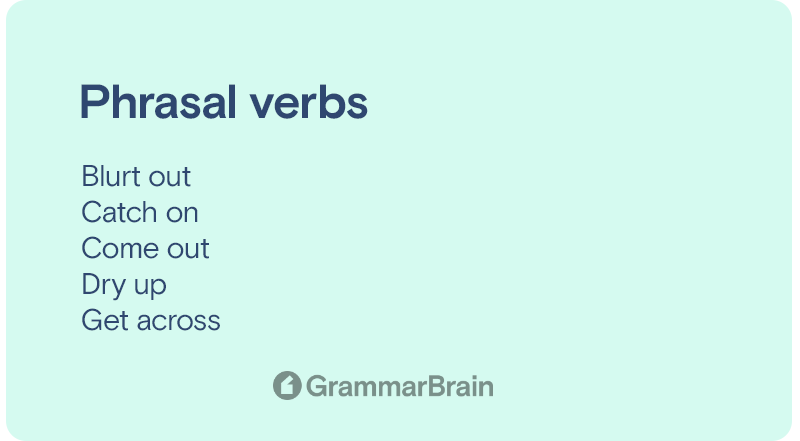
Communication
- Blurt out
James blurted out something inappropriate in the middle of a very serious discussion.
- Catch on
The kids were easy to catch on to the information given by the disaster management relief team.
- Come out
The new company is coming out with a new model for their electric scooter.
- Dry up
The conversation between the two best friends dried up.
- Get across
The politician was trying to get across to the audience by telling his life story.
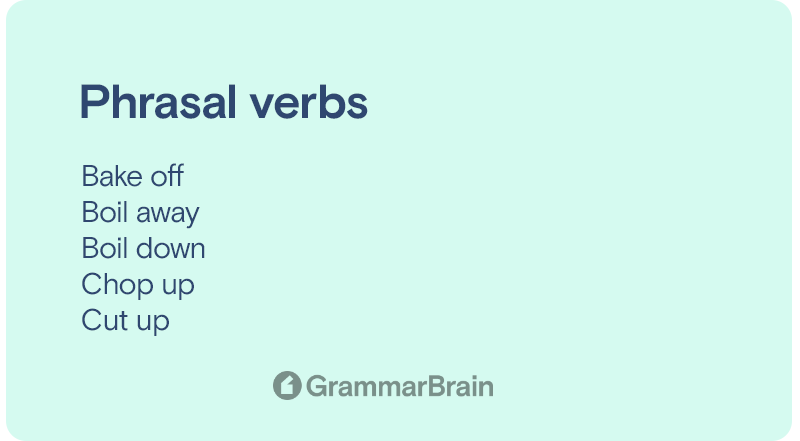
Cooking
- Bake off
Sarah baked off blueberry muffins for the charity event.
- Boil away
James got so busy on his phone that the chicken stock almost boiled away.
- Boil down
You should add enough spinach because it tends to boil down.
- Chop up
Sarah started crying while chopping up onions.
- Cut up
Sarah cut up the chicken pieces into bite-size pieces.
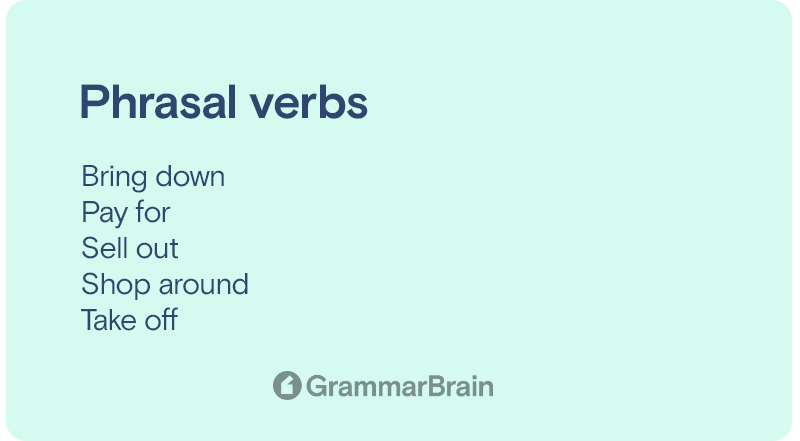
Shopping
- Bring down
The company aimed down the prices of its electric scooters.
- Pay for
James paid heft money for that barbecue grill.
- Sell out
All the pumpkins have been sold out for Halloween.
- Shop around
Sarah usually shops around the whole street to find the best deals.
- Take off
James took off his jacket to sit by the fire
Business
- Ask around
The manager asked around his teammates to find the best solution to the problem.
- Call back
The HR manager is waiting for the new trainee to call back.
- Come across
The manager came across the lost file while looking inside the garage.
- Drop by
The new intern dropped by the office to collect her documents.
- Write up
The team members wrote up their suggestions to give to the manager.
Clothing
- Dress up
Sarah dressed up in a Victorian outfit for the Literature Festival.
- Dress down
Your dress is too glitzy for the event; you need to dress down.
- Hang up
Sarah hung up her wet jacket in front of the fire.
- Have on
Merina had her new party dress on for the date.
- Put on
Sarah forgot to put on her coat before heading out in the cold.
Animals
- Chicken out
James was going to enter the haunted house, but he chickened out at the last minute.
- Duck out
Bill ducked out of the meeting to meet his girlfriend.
- Fish for
Sarah has been fishing for her keys for the past 30 minutes.
- Pig out
James must have been hungry for days; he pigged out on all the food.
- Wolf down
The child wolfed down the entire burger.
Around the house
- Take out the trash
You need to take out the trash on your way out.
- Throw away
Sarah threw away all the old newspapers and paper cups.
- Clean up
Brad usually spends his weekend cleaning up his house and the neighborhood.
- Mop up
The child is mopping up the mess that he made.
- Turn on
You should turn on the reading lamp to read your novel.
Parties
- Party animal
Shane is such a party animal; he kept partying till four in the morning.
- Social butterfly
You will see Luna talking to everyone in every party; she is a social butterfly.
- Throw a party
Charles is throwing a party for his 18th birthday.
- Party pooper
Jessica complained about her school the whole time at the party; she is such a party pooper.
- Crash a party
Sarah crashed her brother’s party.
Driving
- Buckle up
You need to buckle up for the landing.
- Fill up
James could not fill up his tank because he did not have enough cash.
- Get out of
Susanne swiftly got out of the car before it was hit by a truck.
- Run over
The deer was run over by a speeding truck.
- Slow down
There are kids ahead, you need to slow down.
Education
- Take up
Christine has taken up Zumba as her new hobby.
- Fall behind
John is falling behind in his class; he needs to pay more attention to his studies.
- Catch up
The new student may find it difficult to catch up with her classes.
- Go over
James goes over the whole day’s events before going to sleep.
- Read up on
You really need to read up on the history of your country.
Classroom
- Hand out
The teacher handed out all the assignments before the actual date.
- Hand in
You need to hand in your assignment by Monday if you wish to get graded for it.
- Make up
You can make up for all the lost time by taking extra classes.
- Speak up
How will you gain confidence if you do not speak up against the bullies?
- Quiet down
The teacher asked all students to quiet down because they were making a lot of noise.
Work
- Work on
You need to work on your weak points if you wish to succeed in life.
- Work out
James needs to work out the solutions as soon as possible if he wants to keep his job.
- Work over
The project solutions are not bad, but you need to assign somebody to work them over one more time.
- Work through
He worked through his negative thoughts to succeed in his field.
- Work up
Charles had worked up an appetite because of all the overtime he did this week.
Health
- Run over
The deer was run over by a speeding car last month.
- Break out
The allergy caused his skin to break out in painful rashes and blisters.
- Fight off
Sam tried very hard to fight off his cold and fever without taking medicines.
- Pass out
He passed out while walking on the road because he was dehydrated.
- Come down with
James has been sneezing for days, he must be coming down with a cold.
Ideas
- Think up
You need to think up a solution soon, we are running short on time.
- Start over
We need to start over and redo the entire project.
- Figure out
Sarah needs to figure out what to do next.
Money
- Pay off
James and Sarah have paid off their mortgage after working hard for five years.
- Fork out
Charles has forked out a considerable sum of money for his future.
Rip off
The local shopkeepers ripped off the tourists.
- Save up
James and Sarah are saving up so they can take a long vacation in Dubai.
- Pay back
James still needs to pay Sarah back.
Sleep
- Wake up
James does not wake up until 10 AM, even when he needs to go to the office.
- Get up
The workers had to get up at 4 AM to get to work on time.
- Lie down
Charles slept off as soon as he lay down on the sofa.
- Drop off
Sarah had a late night, so she kept dropping off during the meeting.
- Sleep over
Sarah is sleeping over at Sofiya’s house tonight.
Problems
- Talk over
Sarah talks things over with James every time she is worried about something.
- Wrestle with
Bill has been wrestling with his personal problems for several years now.
- Run up against
The politician ran up against some problems with his people.
- Sort out
The teacher can help you sort out all your problems, you only need to talk to her.
- Run into problems
The concert was perfect, but the team ran into some problems towards the end of it.
Crime
- Break into
The thief broke into the house and stole an invaluable painting.
- Break out of
Jim Moriarty broke out of a high-security prison to go after Sherlock.
- Tip off
The locals of the area tipped off the police about some thieves.
- Bring in
The actor was brought in for questioning by the police.
- Lock up
The criminal should be locked up for all the crimes that he has committed.
Environment
- Wipe out
The whole village was wiped out because of the floods.
- Break down
Do not throw that plastic in the river; it will take millions of years to break down.
- Used up
We have used up so much of earth’s resources. How will we have enough left for our future generations?
- Run out of
What will our future kids do if we run out of fuel?
- Die out
Many species have almost died out because we have taken away their natural habitat from them.
Daily Life
- Calm down
You need to take a few minutes to calm down after running continuously for two hours.
- Cheer up
James always manages to cheer Sarah up on her bad days.
- Come between
James and Sarah have been together for fifteen years. Nothing can come between these two love birds.
- Count on
I know I can always count on my best friends in times of need.
- Fall apart
Sarah is sad because her expensive dress fell apart after washing it only once.
Helping kids understand phrasal verbs
A complete verb is an example of a phrasal verb. It is an example of an idiomatic phrase. It consists of a verb and another particle that create a full semantic unit, also known as a complete verb.
The Importance of Understanding Phrasal Verbs
Phrasal verbs have several meanings, and it might be challenging to understand which one is intended. Some of them may be comprehended quite simply since their meanings are taken literally.
Others are idiomatic, which indicates that their meaning is metaphorical. Because of this, it might be challenging to comprehend their meaning when you are learning them.
How do you recognize Phrasal Verbs?
It is necessary to examine the complete sentence in order to recognize phrasal verbs.
If the words can be taken literally, you can immediately grasp what is being said. If so, then there is a good possibility that you are dealing with a normal verb and a preposition.
In phrasal verbs, you need to interpret the meaning of the words in conjunction with another meaning that has very little to do with the original verbs.
How many different phrasal verbs may be found in the English language?
The English language contains more than 10,000 different phrasal verbs. Because of this, it is very impossible to name all of them, much less commit them to memory all at once.
Learning the meanings of the most common phrasal verbs should be done first. Then, you need to learn the meanings as and when you come across them. This is the most effective way to approach the study of phrasal verbs.
Different varieties of phrasal verbs
Phrasal verbs can be broken down into one of these four categories. These include:
- Phrasal verbs that are capable of being separated and accept objects
- Phrasal verbs that are inseparable from the items they accept as arguments.
- Phrasal verbs that do not accept things as their direct objects (these are always inseparable)
- Phrasal verbs consisting of three words

FAQs
How does a participle work with a preceding verb?
A particle would naturally be grouped with the preceding verb, a preposition with the following noun phrase.
Does the direct object need to be in the middle all the time?
No. Although, some separable verbs require you to put the direct object in the middle every time.
What are prepositional verbs?
Prepositional verbs are very common in many languages, though they would not necessarily be analyzed as a distinct verb type: they are verbs followed by prepositional phrases. It’s important to learn about how a prepositional phrase is constructed and how it interacts with English phrasal verbs.
Sources:
- 80 Most Common Phrasal Verbs
- Phrasal verbs
- Phrasal Verbs
- Phrasal Verbs: Rules, Use and Examples
- Transitive and Intransitive Phrasal Verbs
- Transitive Phrasal Verbs & Intransitive Phrasal Verbs.
Inside this article
Fact checked:
Content is rigorously reviewed by a team of qualified and experienced fact checkers. Fact checkers review articles for factual accuracy, relevance, and timeliness. Learn more.
Core lessons
Glossary
- Abstract Noun
- Accusative Case
- Anecdote
- Antonym
- Active Sentence
- Adverb
- Adjective
- Allegory
- Alliteration
- Adjective Clause
- Adjective Phrase
- Ampersand
- Anastrophe
- Adverbial Clause
- Appositive Phrase
- Clause
- Compound Adjective
- Complex Sentence
- Compound Words
- Compound Predicate
- Common Noun
- Comparative Adjective
- Comparative and Superlative
- Compound Noun
- Compound Subject
- Compound Sentence
- Copular Verb
- Collective Noun
- Colloquialism
- Conciseness
- Consonance
- Conditional
- Concrete Noun
- Conjunction
- Conjugation
- Conditional Sentence
- Comma Splice
- Correlative Conjunction
- Coordinating Conjunction
- Coordinate Adjective
- Cumulative Adjective
- Dative Case
- Determiner
- Declarative Sentence
- Declarative Statement
- Direct Object Pronoun
- Direct Object
- Diction
- Diphthong
- Dangling Modifier
- Demonstrative Pronoun
- Demonstrative Adjective
- Direct Characterization
- Definite Article
- Doublespeak
- False Dilemma Fallacy
- Future Perfect Progressive
- Future Simple
- Future Perfect Continuous
- Future Perfect
- First Conditional
- Irregular Adjective
- Irregular Verb
- Imperative Sentence
- Indefinite Article
- Intransitive Verb
- Introductory Phrase
- Indefinite Pronoun
- Indirect Characterization
- Interrogative Sentence
- Intensive Pronoun
- Inanimate Object
- Indefinite Tense
- Infinitive Phrase
- Interjection
- Intensifier
- Infinitive
- Indicative Mood
- Participle
- Parallelism
- Prepositional Phrase
- Past Simple Tense
- Past Continuous Tense
- Past Perfect Tense
- Past Progressive Tense
- Present Simple Tense
- Present Perfect Tense
- Personal Pronoun
- Personification
- Persuasive Writing
- Parallel Structure
- Phrasal Verb
- Predicate Adjective
- Predicate Nominative
- Phonetic Language
- Plural Noun
- Punctuation
- Punctuation Marks
- Preposition
- Preposition of Place
- Parts of Speech
- Possessive Adjective
- Possessive Determiner
- Possessive Case
- Possessive Noun
- Proper Adjective
- Proper Noun
- Present Participle
- Prefix
- Predicate



